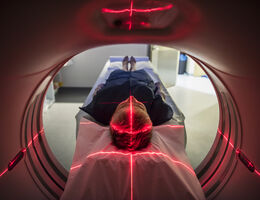

The holiday season ushers in a festive time of year but also presents a unique set of stressors that can weigh negatively on health — especially heart health. It's important to acknowledge which stressors may be at play and take proactive measures to minimize damage to the heart, says Anas Alani, MD, a cardiologist at Loma Linda University International Heart Institute.
Alani outlines how stressors can impact the cardiovascular system and recommends ways to remain heart-healthy throughout the holiday season.
Holiday stressors impact the heart
Holidays can exacerbate existing stressors or create new ones, says Alani — including financial stress, social pressures or obligations, and lapses in healthy lifestyle routines.
“You may feel rushed without enough time to rest or exercise, skip medications, or perhaps you’re traveling, maybe overeating and overdrinking,” Alani says. “These factors compromise your heart and overall well-being.”
Three cardiac concerns grow more prominent around the holiday season, Alani says: heart attacks, certain heart rhythm conditions (arrhythmias), and heart failure exacerbation.
Heart attack: The holiday season tends to coincide with higher rates of respiratory infections, unhealthy habits, and colder weather — all contributors to the annual uptick in U.S. heart attack incidents. Studies report a higher risk of cardiac death around the holidays, with peak days including December 25 and 26 and January 1.
Read: Uptick in heart attacks during winter months — here’s how to stay safe
Arrhythmia: Holidays are associated with increased alcohol consumption. Alcohol is known to trigger, exacerbate, or increase the risk of certain arrhythmias, Alani says — potentially life-threatening irregular heartbeats that require treatment.
Heart failure: Alani says cardiologists and other physicians commonly see more cases of decompensated heart failure around the holiday season. People with heart failure who typically adhere to salt and fluid intake restrictions may disregard such recommendations during the holidays. Festive foods generally include more starch, sugar, and salt, Alani says.
Read: Heart failure: a daunting term, but a manageable disease
“Usually, people aren’t making these choices on just the days of the holidays themselves, but rather over the course of the weeks surrounding the whole holiday season,” he says. “Unlike with heart attacks, we may not see the repercussions of the heart failure right away, but rather in the days after the holidays.”
While people with a known cardiac condition are at higher risk of experiencing holiday stressors' repercussions, Alani says anyone's heart is subject to negative impacts. He says everyone can and should take simple steps to safeguard their heart health.
Safeguard your heart from the stressors
Amidst the holiday rush, Alani recommends several ways to maintain heart health.
Take your medications. Missing medications, forgetting them when away from home, or not getting refills on time are common pitfalls around the busy holiday season. Continue taking them as usual, and obtain refills in advance if needed. Pack enough medication when traveling and extra if you can't return in time.
Exercise moderation with food and drink. Find a balance between enjoying holiday foods and meals without overeating or overdrinking to lower your risk of adverse effects.
Read: Heart health 101: How you can eat to live and live to eat
Pay attention to the warning signs. Whether you’re home or traveling, know what heart symptoms to look out for, and don't hesitate to seek care should you feel them. Symptoms may include chest pain, discomfort, pressure, squeezing, feeling fullness that affects your ability to function, shortness of breath, significant palpitations, dizziness, passing out, and rapid weight gain.
Read: 4 ways to stay heart healthy through the holidays that may surprise you
Stay active. While regular exercise routines may be disrupted, get creative and flexible in finding ways to get active during the holidays — whether going on a simple walk in nature with loved ones or using hotel gyms.
Prioritize self-care and sleep. Busy schedules and social gatherings can take an emotional and physical toll on the body. Emotional and mental health intertwine with heart health, so take the time to rest and nurture your needs. This practice can look different for everyone but can include setting boundaries, partaking in relaxing pastimes, and spending time with those you feel comfortable around.
Read: Protect your heart health amidst anxiety, stress
Prevent respiratory infection. Well-known associations between respiratory infections (such as COVID-19 and influenza) and cardiovascular health show that infections endanger heart health and trigger cardiac events such as heart attacks — especially in those with underlying cardiac conditions. Consider getting vaccinated before traveling.
Read: Discerning risks of COVID-19 and flu infections for cardiovascular patients
Consult your physician. There is a tendency to cancel appointments or put off new medications, testing, or procedures around the holidays. While certain testing or treatments can wait in some cases, they are often time-sensitive and vital. If you are unsure or have questions, ask your cardiologist or physician: Can this wait? Engage in shared decision-making with your care team instead of making the decision alone.
“Following a few simple steps will maximize your ability to spend quality time with loved ones over the holidays while still nurturing your well-being,” Alani says.
Loma Linda University International Heart Institute care teams are committed to providing patients with compassionate, comprehensive, and personalized cardiovascular care. To learn more, please visit lluh.org/heart-vascular or call 1-800-468-5432 to make an appointment.


